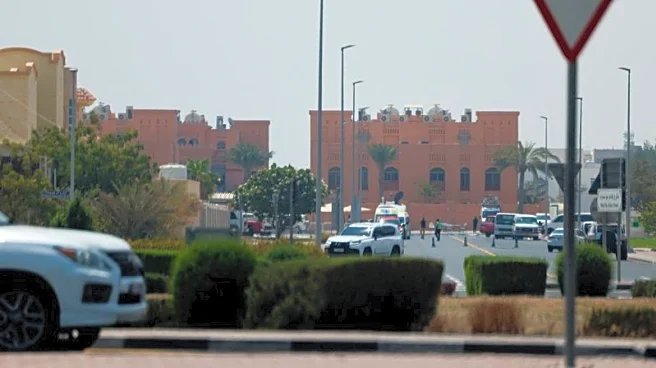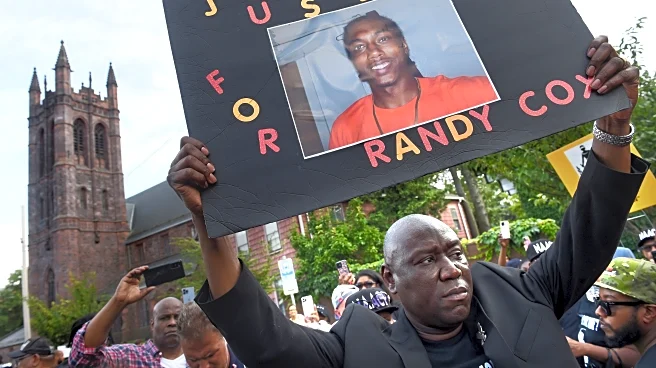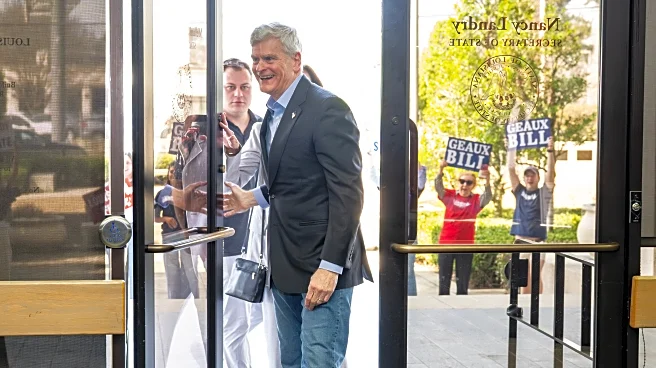By Andrew Mills, Rachna Uppal and Yousef Saba
DOHA (Reuters) -Israel's strikes targeting Hamas in Doha, hot on the heels of an Iranian hit on a U.S. base in the Gulf nation in June, could shake Qatar's
image as a stable business hub as it seeks to balance commercial goals with global diplomatic ambitions.
Qatar's determination to carve out a diplomatic role as a mediator in the Gaza war has already pulled it into a wider Middle East conflict. In June, Iran hit the al-Udeid military base in retaliation for U.S. strikes on Iranian nuclear sites, with most of the missiles intercepted in the skies above Doha.
On Tuesday, Israeli strikes on Palestinian militant group Hamas' political leadership put Qatar in the firing line again.
"Qatar is in the unique position of having suffered both Iranian and Israeli attacks within a few months," said Justin Alexander, director at Khalij Economics and Gulf analyst at GlobalSource Partners.
"There was little discernible impact from the Iranian strikes, but if this begins to look like a pattern, then risk perceptions may shift."
A Doha-based executive at a large Western firm, who declined to be named, told Reuters his company was still evaluating the situation, but business had resumed as normal a day after the strikes, as if nothing had happened.
Another finance professional in Qatar said scaling back business would be a reward to Israel for what he saw as a violation of international law. "Hopefully, this will renew the vigour to do business (in Qatar)," he said.
Tehran's attack in June was telegraphed in advance, giving ample time for Qatari defences to prepare. No one was harmed.
Israel's attack, however, caught Doha by surprise and killed at least seven people, including a member of Qatar's internal security forces, five Hamas members and another individual.
The majority of nearly 3 million people who live in the Gulf state are expatriates drawn from all corners of the world, mostly by business opportunities in one of the world's wealthiest countries.
The host of the 2022 soccer World Cup, Qatar boasts gleaming high rises, a new 10-lane expressway, and a futuristic metro. But it is among the most hydrocarbon-reliant of the Gulf states, lagging neighbours the United Arab Emirates and Saudi Arabia in diversifying its economy, something its government seeks to change by refocusing economic priorities.
Doha has long had key business interests in the U.S., its ally and longtime security guarantor.
State-owned QatarEnergy (QE) is building an ambitious expansion to its LNG output in the massive North Field, which it shares with Iran. Major U.S. energy companies ExxonMobil and ConocoPhillips are key partners in the expansion project, which will almost double Qatar's LNG output.
Golden Pass, which QE owns with ExxonMobil, is building a major LNG export facility in Sabine Pass, Texas, and plans to start exporting LNG later this year.
U.S. President Donald Trump, who visited Doha in May and stayed in a hotel not far from the scene of Tuesday's strike, sought to reassure Qataris after the attack, saying nothing like this would happen on their soil again.
During his May visit, Trump had assured Doha that the U.S. would protect it if it ever came under attack.
The state's Qatar Investment Authority pledged to invest $500 billion in the U.S. over the next decade during Trump's Gulf tour and Trump said defence purchases signed during the trip amounted to $42 billion.
Qatar Airways also signed an order for 160 Boeing jetliners with GE Aerospace engines worth $96 billion, Boeing's biggest deal for wide-body airplanes.
Those economic ties will be closely watched and further instability could throw new investment into doubt, analysts said.
"If there were further attacks, then it would force Qatari-U.S. businesses to re-evaluate the risk and put in place appropriate mitigation measures," said Neil Quilliam, associate fellow at Chatham House.
BOYCOTT LESSONS
Qatar's vast oil and gas wealth helped it navigate a rift with its Gulf neighbours that began in 2017 and endured for over three years. Saudi Arabia, UAE, Bahrain, Oman and Egypt choked off Qatar's economy with a boycott, accusing it of backing terrorists, a charge Doha denied.
Qatar spared no penny fighting off the trade embargo at the time, including flying cows in on airplanes to start a local dairy industry.
For now, no such drastic measures seem to be needed.
Markets appeared to shrug off the strikes, with no negative reactions in Qatari bonds or credit default swaps, instruments that ensure against the risk of a debt default.
In other signs that the region's markets have not flinched, Saudi Aramco pushed ahead with the sale of dollar-denominated Islamic bonds on Wednesday, which Reuters has reported could raise $3 billion to $4 billion.
On Tuesday, Qatar's Doha Bank raised $500 million from a bond sale, pricing the deal not long after the Israeli attacks. It managed to tighten pricing due to high demand.
(Reporting by Andrew Mills in Doha, Rachna Uppal, Federico Maccioni and Hadeel Al Sayegh in Dubai; Additional reporting by Libby George in London; Writing by Yousef Saba; Editing by Maha El Dahan and Ros Russell)











